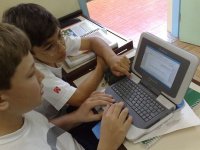College and Career Ready: Soft Skills Are Crucial
Your content has been saved!
Go to My Saved Content.With the speed of change reaching a frenetic pace, the idea of schools preparing students for the future is becoming more and more of a challenge. I was fortunate to attend a P-20 Summit (preschool to doctorate -- I had to ask what it meant, too). Hosted by the University of Texas at San Antonio Office of P-20 Initiatives, the summit addressed where we are now and what we can do to prepare students for their futures.
It was a unique event, especially in terms of summits, in that not only were there four panel discussions from students, public school leaders, higher education leaders, and business leaders, but the audience of parents, teachers, and community leaders all participated in the discussions as well. I would say the high point of the panel discussions was the viewpoint expressed by the business and industry panel.
To start off, the school official panel described all of the programs that they were supporting to help students be college and career ready. They provide after school programs, pullout programs, parent education programs, reading programs, and weekend programs -- all trying to get students prepared for college and work. This great effort is contrasted by them mentioning that two-thirds of our fourth- to eighth-grade students cannot read at their grade level and 6.8 percent of our students will simply drop out of school (Texas Education Agency Report, 2011). When the institutes of higher education took the podium, they shared all of the outreach and remediation efforts taking place at their campuses and also revealed some shocking statistics about our students graduating from high school.
In Texas, of those that choose to go to college, 74 percent go to a junior college. Of those students, 80 percent are required to take developmental math, English or both. Only two out of five students entering college will finish what they started.
Voices from Business and Industry
The most powerful information, however, was revealed when four local leaders from large businesses located in San Antonio were asked questions about how well we are preparing students. The manager from Toyota Motor Manufacturing Texas located in San Antonio, Mr. Mario Lozoya, stated that public education is like a push model of business, such as a doughnut shop. The client walks into the shop and picks from a limited selection of doughnuts. Then you have a burger joint that actually asks you, "What would you like on your burger?" This would be a pull model of business, and that is what business wants from schools.
He stated that we are preparing students for jobs that do not exist anymore because we don't ask business what kind of employee they need. Mr. Lozoya lamented that the hardest jobs to fill at Toyota are the jobs that require problem-solving skills, such as skilled technicians to fix the conveyor belts, cooling systems, or the robotic devices.
Johnathan Magid from Rackspace Hosting, a cloud computing company, stated that in interviews he doesn't place much emphasis on what the individual knows right now. He is looking for someone who can learn on the fly a completely new programming language because what is currently being used may be outdated in six months. He said that we do ourselves a disservice by using the terms "soft-skills" when referring to reasoning, logic, collaboration, communication, and thinking skills. He emphatically stated that in the information technology industry, these skills are crucial and anything but soft because they are the most difficult to master and, unfortunately, fairly rare in employee candidates.
In the Classroom
So what does it take to prepare students to be college and career ready? It takes 21st century schools. I have been fortunate to become acquainted with Anne Shaw, who has been striving to do just this since 1994. She's created the organization 21st Century Schools and with her dedicated team of professionals, provide school systems all around the globe with the tools to change schools so that today's students will have what they need to be successful in college and career tomorrow. For example, July 22-29th, 21st Century Schools will be hosting an institute in San Antonio to help schools, teachers, and instructional leaders worldwide, to find ways to improve media literacy, innovation, create green classrooms and actually design classrooms that are preparing students for success in the 21st century.
The 21st Century Schools organization runs on the philosophy that students need the critical skills that Mr. Magid from Rackspace mentioned. Interestingly enough, the ten college and career readiness skills that I espouse in my book, Teaching Students To Dig Deeper: The Common Core in Action, are parallel to the skills that 21st Century Schools recommend:
- Critical Thinking and Problem Solving
- Collaboration across Networks and Leading by Influence
- Agility and Adaptability
- Initiative and Entrepreneurialism
- Effective Oral and Written Communication
- Accessing and Analyzing Information
- Curiosity and Imagination
These critical skills are what businesses are clamoring for in their future employees -- our current students. It is nice to see that we have organizations such as 21st Century Schools and Edutopia to lead the way in helping schools provide the above skills to students.
Yes, students need discrete knowledge and skills on many subjects in order to be literate and professionals in the classroom can help students acquire that knowledge. However, these same professionals can also help students acquire college and career readiness skills like the ones Mrs. Shaw proposes. Which, interestingly enough, if done well, will make it easier for students to learn the required content.
What do you think about the list of attributes for 21st century learning and how do you weave them into your learning activities in your classroom?
